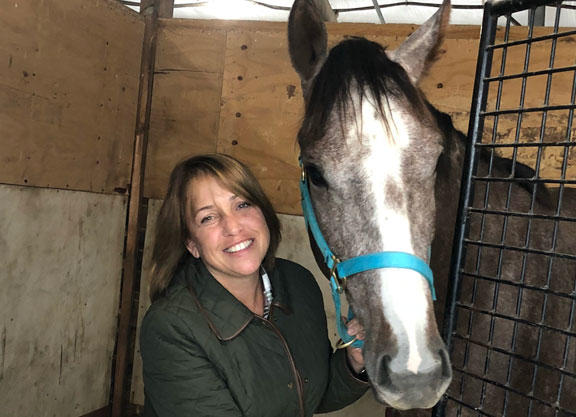By Diana Pikulski
Turning for Home, Inc. was created by the Pennsylvania Thoroughbred Horsemen's Association (PTHA) in 2008 as a model program for racehorse retirement at Parx Racing. Parx was the first to implement a mandatory funding plan simultaneously with rules forbidding horse owners and trainers from sending horses to, or allowing horses to end up in slaughterhouse kill pens. The program was a success from inception and it has evolved from there. We caught up with the current program administrator Danielle Montgomery to talk about the program's solid support, success stories and her concerns for the program, which has placed close to 3,000 horses, if Pennsylvania Governor Tom Wolf's proposal to raid the Race Horse Development Trust Fund goes through.
DP: Danielle, how does Turning For Home work?
DM: Horses that have been continuously stabled on the grounds of Parx Racing for 90 days prior to the time of application into Turning For Home, or have raced in the last 30 days with a trainer that is based at Parx for at least six months of the year, are automatically eligible. The owner or trainer brings me the paperwork and we evaluate the horse. We have 19 farms that re-train and adopt out our horses. We pay the farms an average stipend of $1,500 per horse. The farm then sets their own adoption fee.
DP: How is Turning For Home funded?
DM: The funding comes from the Parx horse owners and jockeys, the PTHA, racetrack management, and the PA Horse Breeders Association. Primarily, the funding comes through a $30 per-start fee paid on every start at Parx. Sometimes owner and trainers make additional donations for their horses.
DP: How do you handle horses that are not sound for retraining when they are retired from racing?
DM: We have three veterinarians that review the horse's condition and prognosis and we have great veterinarians and vet hospitals that are willing to help us with surgery or treatments if the result will be a sound horse. If the horse is going to be in chronic pain with little or no chance of recovery, even after surgery, we euthanize the horse. Luckily, we have some flexibility in our stipends so that we can pay a bigger stipend if a horse needs a longer rehabilitation time. We put down less than 3% of the horses that come through our program.
DP: What is your background with horses and racing?
DM: I started on the racetrack when I was 16 and over time, I had my trainer's license in five states. I worked for some really successful great trainers. Eventually, my husband I and bought a farm and started a family. I had ridden and showed as a young person so my husband and I always had retired racehorse 'project' horses on the farm. Then I went to work as an executive assistant and I learned my office skills. When the position at Turning For Home came up, it was a perfect fit because it combines all of my skills.
DP: To what do you attribute Turning For Home's success?
DM: There are many reasons. It was started the right way by PTHA Executive Director Michael Ballezzi and the PTHA Board of Directors. The horsemen at Parx totally embraced. They are grateful for the service. They always wanted to do the right thing for their horses. They love their horses. But it used to be hard because they had no resources and it was difficult to keep track of where the horses went and if they were safe. A lot of horses used to end up in the slaughter pipeline. So, now there is no question. The horses go through our program and we keep track of them. Plus, now, more than ever in the past 30 years, there is a demand for Thoroughbreds in showing, eventing and therapy. We have had many horses in the Thoroughbred Makeover. The trainers are always excited to hear how their horses are doing in their second careers.
DP: Do you take PA-breds or Parx horses even if they are no longer racing at Parx?
DM: Well, we try to help all PA-breds and horses that may have had a career at Parx especially if they are in trouble. We have gotten calls about horses in the kill pen or needing rescue somewhere and we take them. Last year brought home Barlovento Tiger (Big Brown) from Puerto Rico when they stopped racing him there. This was through a partnership with Caribbean Thoroughbred Aftercare. His breeders helped as well. We are currently working on getting James Lee (Changeintheweather), another PA-bred who ran at Parx for years, home from Puerto Rico. He's had 102 starts and has been in Puerto Rico since August 2016.
DP: What about Turning For Home makes you the most proud?
DM: The number of horses that we save every year and the great partnerships that we have with the re-training and adoption farms. Over time, with education and good results, more trainers are sending horses to us sound. We have horses placed all over the country and in every discipline. We work with farms that are already established as Thoroughbred farms so they understand the breed and they do the work out of love for the horses. The horse always comes first. Some of these farms are Thoroughbred breeding farms and they are already are taking back the horses they bred to rehome them. They are willing to take a few of ours to be helpful and to be good partners. I'm so worried that if the industry loses funding, the whole thing will fall apart and we won't be able to do this important work.
For more information go to https://patha.org/?s=, or contact Danielle Montgomery at turningforhome@patha.org.
Diana Pikulski is a partner at Yepsen & Pikulski and the editor of the Thoroughbred Adoption Network.
Not a subscriber? Click here to sign up for the daily PDF or alerts.






